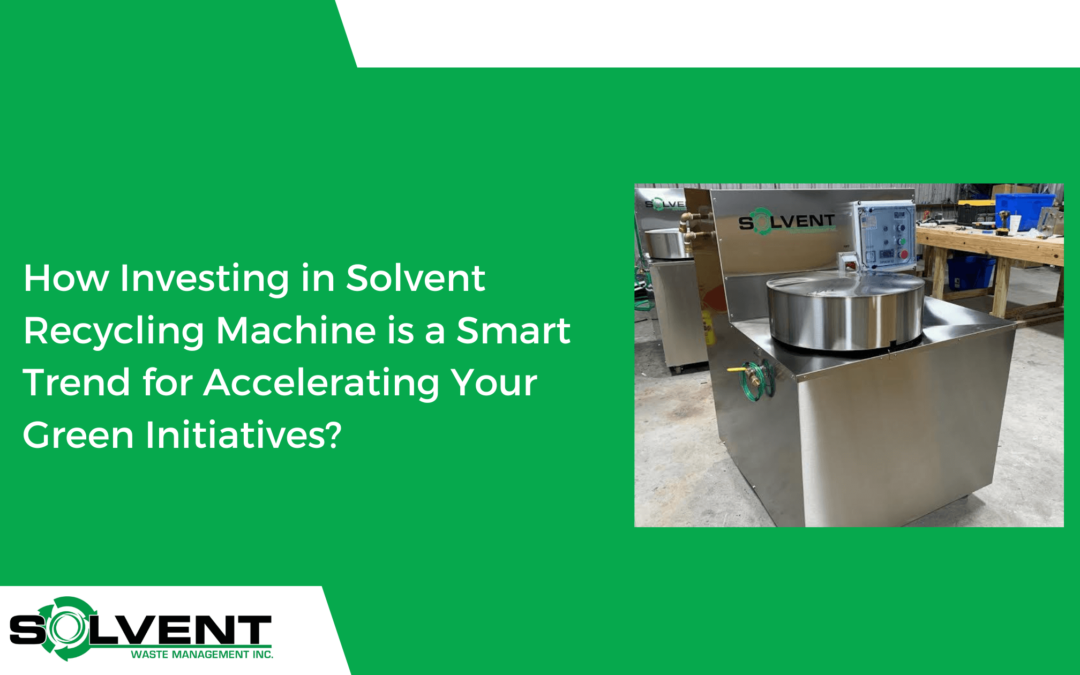In today’s rapidly evolving industrial landscape, sustainability has emerged as a crucial driving force. It’s a fundamental principle that shapes business strategies and consumer preferences. As an industry owner, embracing eco-conscious practices isn’t just a responsibility towards the environment, but also a strategic decision that can yield numerous benefits for your business.
A good solvent recycling methodology ensures to enhance your brand reputation as well as tremendously improves operational efficiency. One trend that stands out in this endeavour is the investment in a solvent recycling machine. In this comprehensive guide, we will explore the compelling reasons why industry owners should consider to make smart long-term investment in Solvent Recycling Machine to accelerate their green initiatives.
I. The Environmental Imperative
Safeguarding our planet’s resources and mitigating the impact of industrial processes on the environment have become key priorities across sectors. Investing in a solvent recycling machine is a proactive measure that demonstrates your commitment to sustainability. By reprocessing used solvents, you contribute to reducing the demand for virgin materials, conserving energy, and decreasing overall waste production.
II. The Financial Rationale
While the initial cost of acquiring a solvent recycling machine might seem substantial, it’s crucial to view it as a long-term investment with significant returns. The financial benefits of solvent recycling are multifold. By reusing solvents, you substantially cut down on procurement costs, which can have a substantial positive impact on your bottom line. Additionally, as society places increasing importance on eco-friendly practices, businesses that prioritize sustainability often enjoy enhanced brand reputation and customer loyalty.
III. Unveiling Operational Efficiency
Incorporating a solvent recycling machine into your operations isn’t just a sustainable choice—it’s a smart move to streamline your processes. These machines are designed to purify and restore solvents to their optimal condition. This translates to consistent and reliable performance in your production cycles. As a result, you can experience reduced downtime, improved product quality, and enhanced overall operational efficiency.
IV. A Green Image for Brand Enhancement
In today’s socially conscious marketplace, the image your brand portrays holds immense value. Investing in a solvent recycling machine communicates your dedication to environmental preservation and responsible business practices. This can attract environmentally conscious clients, partners, and investors who prioritize collaboration with eco-friendly entities. Moreover, showcasing your green initiatives can be a source of pride for your employees, fostering a sense of purpose and engagement.
V. Overcoming Challenges:
Investing in a solvent recycling machine offers significant environmental and cost benefits, yet challenges persist. Initial costs and technical intricacies can be daunting. However, thorough research to choose the right equipment aligned with your industry needs mitigates these hurdles. Regulatory compliance demands, coupled with changing waste management norms, add complexity. Collaboration with experts for installation, operation, and maintenance guidance is paramount. Adapting to new workflows and training staff might pose challenges, but the long-term advantages of reduced solvent purchase and waste disposal costs, along with a smaller environmental footprint, make overcoming these initial obstacles a prudent investment in the future.
Frequently Asked Questions
1. What types of solvents can be recycled?
Solvent recycling machines are designed to handle a wide array of solvents, including but not limited to acetone, xylene, toluene, and ethanol. It’s advisable to review the machine’s specifications to ensure compatibility with the specific solvents used in your industry.
2. Is the installation process complex?
Solvent recycling machines are typically designed for straightforward installation and operation. Many manufacturers offer comprehensive guidelines, and some may even provide on-site support during the setup process.
3. How does solvent recycling contribute to cost savings?
Solvent recycling presents a twofold financial advantage. First, reusing solvents dramatically reduces your procurement expenses. Second, the extended lifespan of recycled solvents can lead to savings in disposal fees and the overall procurement process.
4. Are there regulatory considerations for solvent recycling?
Regulations pertaining to solvent recycling can vary by region and industry. It’s essential to conduct thorough research to ensure compliance with local environmental and safety regulations. Engaging with regulatory experts can provide valuable insights in this regard.
Conclusion: Pioneering Sustainability through Innovation
In the pursuit of a greener and more sustainable future, industry owners find themselves at a critical juncture. The decision to invest in a solvent recycling machine is more than an operational upgrade; it’s a testament to your commitment to environmental stewardship and responsible leadership.
As you navigate the complex landscape of modern business, remember that sustainability is not only a moral obligation but also a strategic opportunity. Investing in a solvent recycling machine stands out as a wise and impactful choice that reaps both immediate and long-term rewards. Hence, by embracing the trend of solvent recycling, you position your business as a champion of both innovation and environmental responsibility, paving the way for a brighter and more sustainable tomorrow.

